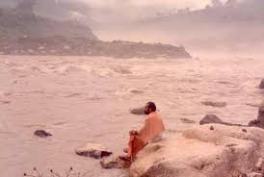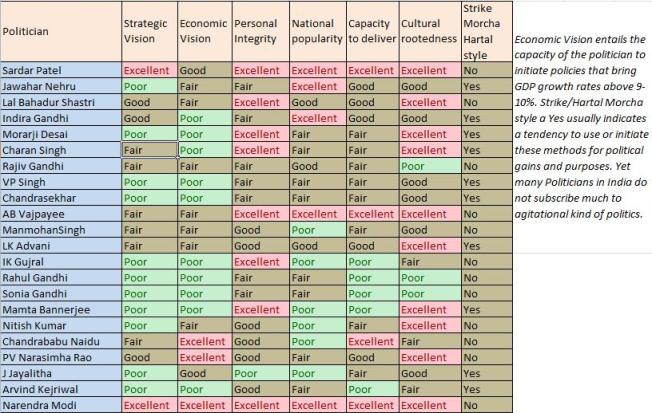Narendra Modi never had an easy life. Neither till his teenage years were over, nor beyond till this date. Yet one important choice he made, that made his life purposeful, was straight out of Krishna’s message to Arjuna: To immerse himself as a Karmayogi. Few people know he never fought an election in his life till after he became the Gujarat Chief Minister first time in 2001. That as a teenager his instincts were to become a monk at the Ramakrishna Mission. That he seeked detachment from world and family much like Buddha at a very young age is again little known. A Monk advised him, much like what the Mission recommends to itself, the need to serve society. Modi became a Sevak at the RSS and remained rooted in Indian ethos by that association.
In his association, like possibly in every other big setup, there were organizational and process management opportunities to be imbibed. Narendra Modi internalized the experiences from a very Dharmic perspective. One completely shorn of self-aggrandization. He proceeded with those principles to this day. He rose due to his organizational and process management ability and instincts, yet he never used those to promote his family and self. In itself, for those acquainted with typical politicians in India over the last century, only a very few may score close on these qualities as does Narendra Modi. And those that do score close to his personal sacrifices, don’t score closely enough on the practicality aspect of his vision. To bridge the Dharmic rooted perspective to Modern management skills necessary to sustaining the India story is not an easy one for an ordinary person to cross over. Those skill sets emerge only with endured pain, hardship, sacrifice, right thinking and an eagerness to serve.
It is precisely these qualities: the persistence in serving selflessly, the imbibing of simple rational approaches to process management that his organizational abilities began to emerge and be noticed. A deep down conviction led to Tyaag (sacrifice), Tyaag with conviction led to clarity in approach. Clarity in approach led to an evolving emergence of vision. The conviction in that vision emerged to a statesmanship that few understood and many cynics failed completely to comprehend. Narendra Modi did not seek ‘rewards’. The ‘rewards’ came to him. His stature rose solely due to what he could deliver. He did not lead Morcha’s, Bandhs, Strikes, Hartals, Agitations to rise like many other politicians even in his represented party. He did not belong to any political moneyed dynasty, he did not do wheeling and dealing, and neither he was a professional that was made it as a Rajya Sabha kind of appointee. No, Modi worked, delivered and worked some more. He listened more, talked less, analyzed even more all over these years. He never even then stood for elections or coveted a high post for self. Service remained a motivating credo for Modi always. Then came the big shake. The Gujarat earthquake.
On 7th October 2001, Modi was appointed (not elected) as CM of Gujarat. Patels’ reign as CM was mired in corruption, chaos, poor performance and age related competency issues. Modi would have known as he refused to be a Deputy CM to Patel. Even a Deputy CM ranking was a very huge personal jump for Modi from where he was. But he walked away calmly from that and would become CM with the condition he would be fully responsible for the State. His first 120 days he would be immersed in organizing and providing relief to the devastated regions of the massive earthquake that hit Gujarat earlier. And he did a commendable job. Then Godhra happened. The one thing that should have struck was even as the train fire embers were burning, Modi ordered his top cop to escort returning Hajj pilgrims safely to their homes. Within hours he realized he was woefully short of forces and wrote letters to neighboring states to assist him with police cadre. As the scale of devastation increased in 48 hours, Modi ordered police shoot at sight orders. Almost 300 Hindu’s were killed in police firing. Yet few people know Narendra Modi had never stood in an election till even then.
Modi imbibed a lot from the RSS in terms of cultural ethics, values, discipline and possibly more. Yet much he reserved deeper within were at odds with the RSS. Even during the 2002 elections Modi’s ideas of governance then revolved around privatization and small government, which stood at odds with what journalists described as the “anti–privatization, anti–globalization position” of the RSS. From a perpetually power and water deficit to power and water surplus State, Modi achieved it through hard work, rational policy and terrific organizational and administrative ability. Fast forward to 2012 elections and Modi was still again at cross roads with the RSS and VHP who supported the Oust Modi Campaign in favor of Patel. But Modi stood fast. He continued to respect RSS for it’s cultural ethics and moorings but not necessarily on it’s developmental vision and moorings. That steadfastness and conviction is what separated Modi from the rest. And that inability to differentiate of many in the press and beyond made people fear a rise of some totalitarian. Nothing could be more incorrect. For a person to be endorsing federalism and devolution, a small government and maximum governance: nothing can be further than than Fuhrer kind of Fascism. Those that equate Modi with Fascism have a fundamental flaw in their thinking: One that blinds them to emerging Maoist or Islamist fascism as opposed to a person that inherently believes in Dharma, devolution and less government. The flaw lies not in Modis way but possibly in both the 40’s dress code of the RSS as well as the flawed thinking that inherits some of the ‘Macaulyzed’ in India devoid of basic analytical ability and skill and the arrogance of dismissiveness.
Yet, while it is not easy to bracket the diversity of the political discourse and composition in India and how Modi fits in it or stands different, an attempt can be made. One thing that emerges from the effort is that Modis rise is unlike that of normal politicians which one can bracket in 4 main categories:
- Dynasty claimants
- Morcha/ Bandh/ Agitation Opportunistic kind
- Appointees that cannot win popular elections.
- Money splurging deal makers
These variety of politicians make the entire politic community in India from almost pre-independence to today. The Nehruvian Dynasts, Scindias, Yadavs, Gowda’s and a large number fit in the first. They may have no vision, no organizational capability, no skills or even intelligence, yet they are in the fray because of bloodline. The Morcha/ Bandh politicians are interesting as many emerge from very humble backgrounds. Yet like Mamta Bannerjee , George Fernandes, Bal Thackeray, Jayalitha and today Arvind Kejriwal kinds they represent more a degree of anarchy than any good governance solutions and veer too much left for comfort. The third variety are the Rajya Sabha nominee type: Manmohan Singh and those that have cabinet posts on the basis of a nomination and not a popular election. The last one are the ones that possess splurge money. Usually this is the criminal background variety and have been dominant in many states including Bihar, UP: The booth capturing variety and they do win elections. These are also used by assorted dynasts and have seats and multiple election wins to boot. Yet they have no vision and no solutions for either development or governance.
Further one can do an simple classification and self assessment on the deliverability of a leader at a national level. A simple example is given below:
That above in its entirety spells the political spectrum that exists in India. Every politician one can think of today fits in the above 4 major categories. Except possibly one today. Narendra Modi. Every politician since Independence performs poorly on some indicator in the above chart. Except possibly one: Narendra Modi. The choice for an individual thus should not be a difficult one to make because only one politician cuts beyond the baggage that Politicians offer their constituents. Narendra Modi.


harbans ji,
Please define what excellent, poor, good, fair etc mean elaborately. This will make it fair. Furthermore, make two charts of those who have been PMs and those who are currently in the PM race.
this will make it more complete.
Regards,